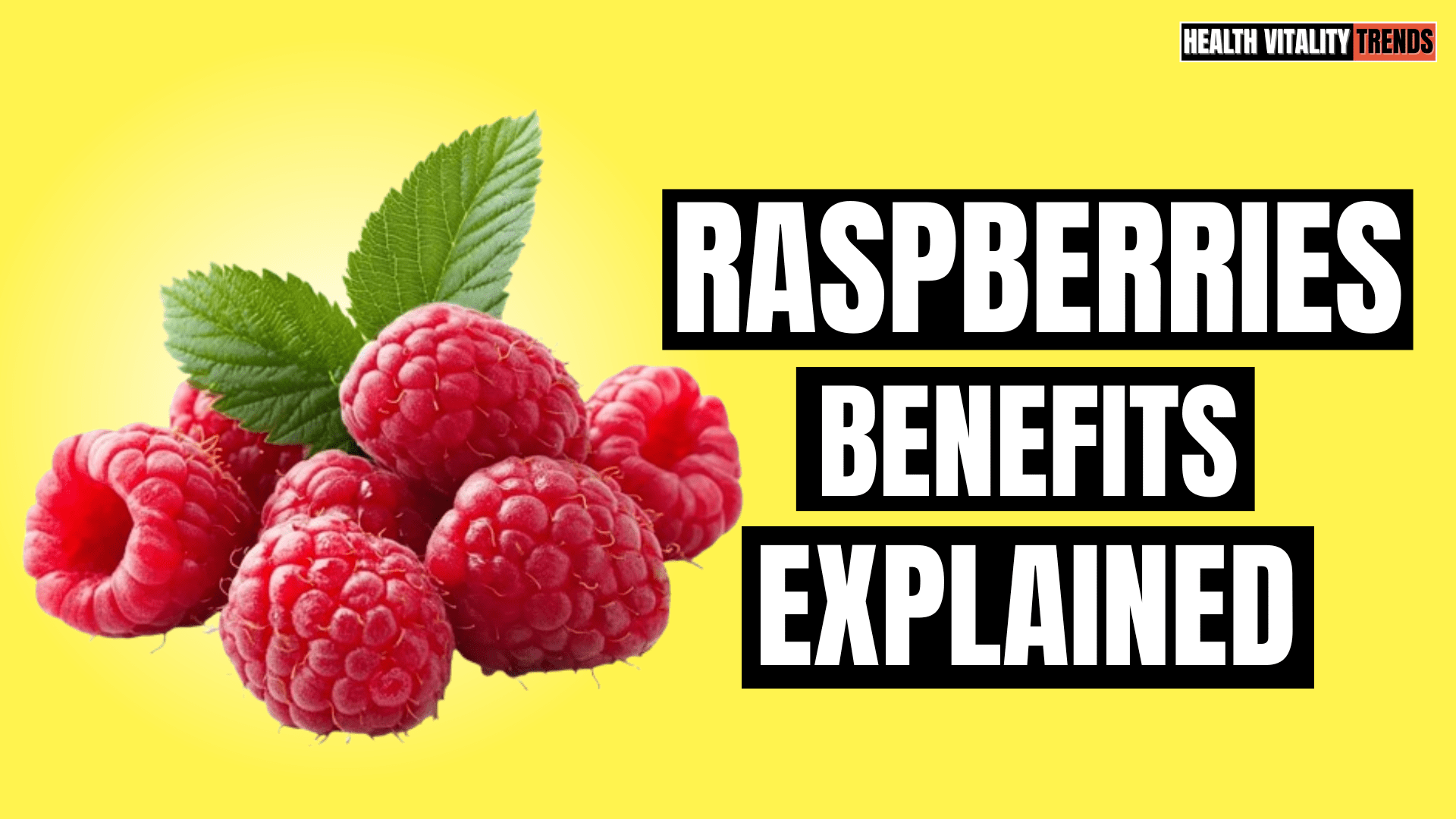
RASPBERRIES: Fiber-Rich Gems That Tackle Blood Sugar & Gut Health
Raspberries are small, vibrant red berries known for their sweet-tart taste and high nutritional value.
Packed with fiber, antioxidants, and vitamins, these fruits have been linked to helping with better digestion, heart health, and reduced inflammation.
Whether eaten fresh, frozen, or blended into smoothies, raspberries offer a versatile and refreshing way to improve overall health.
Let’s explore what makes raspberries special, their nutrition profile, health benefits, and the best ways to enjoy them.
What are Raspberries?
Raspberries (Rubus idaeus)[1] are edible berries belonging to the rose family (Rosaceae). They are native to Europe and northern Asia but are now widely grown across the world, especially in North America.
While red raspberries are the most common, you can also find black, purple, and golden varieties.
Historically, raspberries have been used in herbal medicine for their anti-inflammatory and digestive properties.
Today, they are enjoyed fresh, frozen, or dried, and used in jams, sauces, baked goods, and teas.

What Do Raspberries Taste Like?
Raspberries have a delicate texture with a juicy, sweet-tart flavor. When perfectly ripe, they balance natural sweetness with mild acidity, making them refreshing to eat raw.
Unripe berries can taste sour, while overripe ones may be mushy and overly sweet.
Fun fact: In European traditions, raspberries are often paired with chocolate or cream-based desserts because their tartness balances richness.
Raspberries Nutrition Facts
Here’s the nutritional profile of 1 cup (123 g) of raw raspberries according to USDA [2] data:
| Nutrient | Amount per 1 cup (123 g) |
|---|---|
| Calories | 64 |
| Carbohydrates | 14.7 g |
| Dietary Fiber | 8 g |
| Sugars | 5.4 g |
| Protein | 1.5 g |
| Fat | 0.8 g |
| Vitamin C | 32 mg (36% DV) |
| Vitamin K | 9.6 mcg (8% DV) |
| Folate (B9) | 25 mcg (6% DV) |
| Magnesium | 27 mg (6% DV) |
| Manganese | 0.8 mg (41% DV) |
Explanation: Raspberries are one of the richest dietary sources of fiber, with 8 g per cup, supporting digestion and satiety. They are also loaded with vitamin C, manganese, and antioxidants like ellagic acid and anthocyanins, which contribute to your health benefits.
Health Benefits of Raspberries
1. Rich in Antioxidants
Raspberries contain anthocyanins and ellagic acid, which help protect cells from oxidative stress and may reduce the risk of chronic diseases.[3]
2. Supports Heart Health
Their high fiber and polyphenol content improve cholesterol levels, reduce blood pressure, and support overall cardiovascular health.[4]
3. Aids Digestion and Gut Health
With 8 g of fiber per cup, raspberries promote bowel regularity and feed beneficial gut bacteria.[5]
4. May Help Manage Blood Sugar
Studies suggest that raspberries may improve insulin sensitivity and reduce post-meal glucose spikes, making them a smart choice for diabetics.[6]
5. Supports Weight Management
Although they are low in calories, but are high in fiber and water. Raspberries help you feel full longer, aiding in weight control.[7]
6. May Protect Against Cancer
Preliminary research shows ellagic acid in raspberries may slow tumor growth and offer protective effects.[8]
How to Eat Raspberries
- Eat fresh berries as a quick snack.
- Blend into smoothies or yogurt.
- Add to oatmeal, cereals, or salads.
- Use in desserts like pies, muffins, and cheesecakes.
- Brew raspberry leaf tea, traditionally used for women’s health.
How to Store Raspberries to Keep Them Fresh
- Refrigerate: Store unwashed raspberries in a breathable container. They typically last around 2 to 3 days.
- Wash only before eating: Moisture speeds spoilage.
- Freeze for long-term use: Spread berries on a tray before transferring to a freezer bag. They can last up to 12 months frozen.

Possible Side Effects and Precautions
Side Effects
- Allergic Reactions – Rare but possible, especially in individuals allergic to berries. Symptoms may include itching, swelling, or rash.
- Digestive Discomfort – High fiber may cause bloating or gas in sensitive individuals.
- Oxalates – Raspberries contain oxalates, which in excess may contribute to kidney stone formation (PubMed)[9].
Precautions
- People with Kidney Disorders should monitor their intake due to oxalates.
- Diabetics should eat in moderation, by tracking portion sizes despite their low glycemic index.
- Individuals on blood-thinning medications should consult a doctor since raspberries contain vitamin K.
- Pesticide Exposure – Choose organic-grown berries whenever possible to minimise pesticide contact.
Fruits Similar to Raspberries
- Blackberries – Similar taste and appearance, but slightly larger.
- Strawberries – Sweeter, with less fiber but higher vitamin C.
- Blueberries – Sweeter and less tart, also rich in antioxidants.
- Mulberries – Similar structure but softer and sweeter.
Common FAQs About Raspberries
1. Are raspberries good for diabetics?
Yes, raspberries have a low glycemic index and may help regulate blood sugar when eaten in moderation.
2. Can you eat raspberries every day?
Absolutely! A daily serving can boost fiber intake and support long-term heart and gut health.
3. Are frozen raspberries as healthy as fresh ones?
Yes. Freezing preserves most nutrients, especially fiber and antioxidants.
4. Do raspberries help with weight loss?
Yes, their fiber and low-calorie content make them excellent for weight control.
Conclusion
Raspberries are not only delicious but also a nutrient-packed fruit, offering antioxidants, fiber, and essential vitamins. Regular consumption can support digestion, heart health, blood sugar control, and even long-term disease prevention. Whether eaten fresh, frozen, or blended into recipes, raspberries are a simple and tasty way to improve your diet and overall well-being.
References
- [1] https://en.wikipedia.org/wiki/Rubus_idaeus
- [2] https://snaped.fns.usda.gov/resources/nutrition-education-materials/seasonal-produce-guide/raspberries
- [3] [4] [5] [6] [7] [8] https://www.ejmoams.com/ejmoams-articles/antioxidant-activity-of-raspberries-and-their-health-benefits-95158.html
- [9] https://pubmed.ncbi.nlm.nih.gov/21557843/








